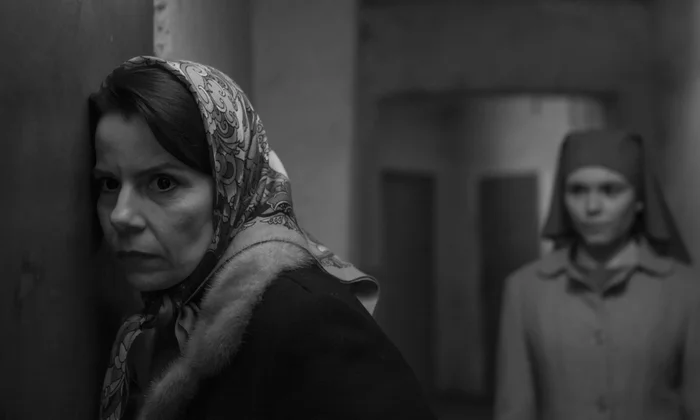Have you ever felt completely adrift, disconnected from the world and its rules? The philosopher Gilles Deleuze had a term for this: deterritorialization. I think this is the perfect lens through which to view Paweł Pawlikowski’s masterpiece, Ida. The film masterfully shows us what it means to lose your “territory”—not just land, but your entire sense of self.
Table of Contents
- 1.1 Why Does Ida Return? A Look at Deleuze and Deterritorialization in Pawlikowski’s Film
- 1.2 🤔 What is Deterritorialization, Really?
- 1.3 🗺️ Beyond Land: Redefining “Territory”
- 1.4 🪙 Wanda and Ida: Two Faces of Deterritorialization
- 1.5 🔄 The Power of Repetition (and Why It’s Not Boring)
- 1.6 🎭 Ida’s Blank Slate: The Concept of the Face
- 1.7 ✨ From Facelessness to Feeling
Why Does Ida Return? A Look at Deleuze and Deterritorialization in Pawlikowski’s Film
Have you ever watched a film and felt there were deep, philosophical currents running just beneath the surface? That’s exactly the feeling I get with Paweł Pawlikowski’s stunning film, Ida. Your analysis of it touches on some fascinating ideas from the philosopher Gilles Deleuze, especially the concept of deterritorialization.
Let’s dive into what this complex idea means and how it shapes the journey of Ida and her aunt, Wanda.
🤔 What is Deterritorialization, Really?
First, let’s unpack the main idea. You might think of it as a kind of “statelessness,” but it’s much more than that. Deterritorialization is the process of detaching from established norms, social expectations, and even physical places. It’s a feeling of not belonging anywhere, of being disconnected from the moral and material ties that define our world.
A person experiencing this doesn’t feel they own or belong to any specific territory.
🗺️ Beyond Land: Redefining “Territory”
So, what makes a “territory”? It’s not just about physical land or borders on a map. A territory is built from social expectations, rituals, and moral codes. These repeated practices are what give a place meaning and create a sense of belonging for you and me.
When these structures break down, as they did in post-communist Poland, a whole society can become deterritorialized, disconnected from its own history and unable to form a coherent story.
🪙 Wanda and Ida: Two Faces of Deterritorialization
The film gives us two powerful examples in Wanda and Ida. Wanda is the embodiment of deterritorialization. She is disconnected, cynical, and adrift. Her tragic suicide can be seen as the ultimate result of this amplified feeling of placelessness. That final, indifferent act of placing her cigarette in the ashtray before she jumps speaks volumes about a life where all actions have become equally meaningless.
Ida, on the other hand, starts her journey within the highly defined “territory” of the convent. She has a clear world of meaning. Her journey is about what happens when she steps out of it.
🔄 The Power of Repetition (and Why It’s Not Boring)
Here’s where another of Deleuze’s ideas comes in: repetition. For Deleuze, true repetition isn’t just copying the same thing over and over. Every repetition creates something new.
Think about Ida’s story. She leaves the convent, experiences the secular world with Wanda, and then returns. But is she the same person? Absolutely not. Her return is a repetition, but it’s loaded with new meaning. The familiar rituals of the convent are now performed by someone who has confronted her past, experienced loss, and fundamentally changed. Repetition, in this sense, creates difference.
🎭 Ida’s Blank Slate: The Concept of the Face
Have you noticed Ida’s stoic, almost blank expression for much of the film? This connects to Deleuze’s concept of defacialization. This isn’t about literally not having a face, but about the “face” as a social construct.
The church has given Ida a kind of “facelessness.” Her identity has been stripped away and replaced by a system-imposed one, making her a vessel for fixed meanings. Her face doesn’t show the sorrows and experiences of a life lived. Wanda’s face, in stark contrast, is a map of her pain and disappointment.
✨ From Facelessness to Feeling
As Ida engages with the world outside the convent, something amazing happens. Her face begins to change. You see her experience happiness and sadness. She moves from a detached, “cold” existence to one of genuine emotional engagement. This transformation shows her moving away from that imposed facelessness and building an identity of her own, forged through her unique experiences.
- Power Moves with Shaquille ONeal and the Future of Basketball
- From the Court to the Boardroom: Shaq’s Legacy and the Rebirth of Reebok
- Alicia Silverstone’s “Irish Blood” Divides Audiences with First Episodes
- Batista Isn’t Crazy and Claudette Would Be – Dexter: Resurrection Episode 7
- The Banshees of Inisherin: Thrownness, Pride, Anxiety, and Nothingness
- Jeanne Dielman: Digging into Life’s Authenticity and Big Questions
- Are You Socially Asleep? A Look at Ikiru & Nietzsche
